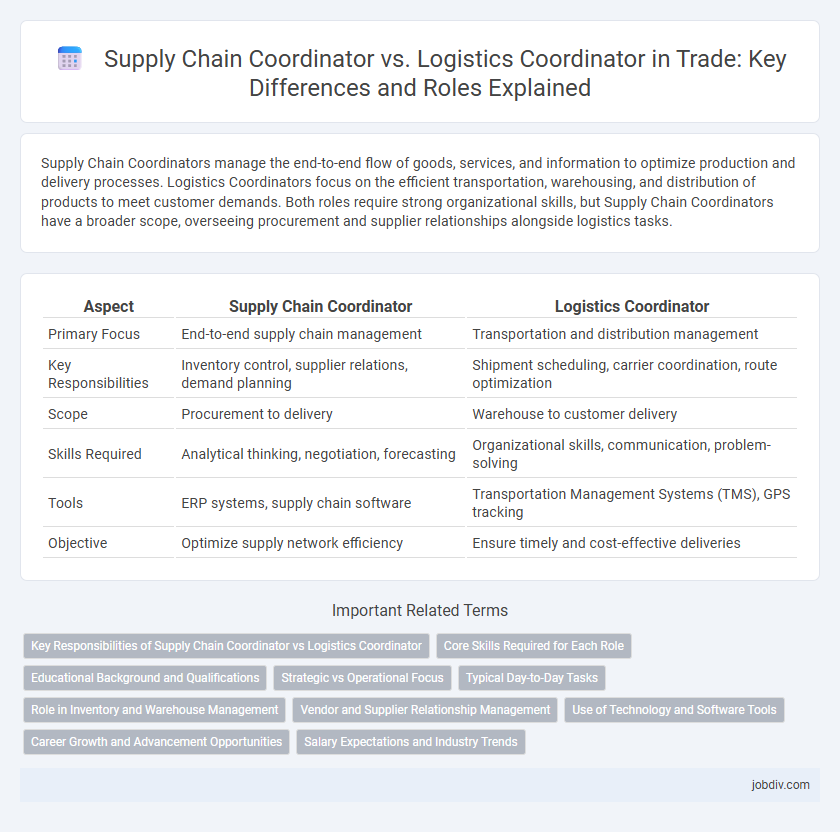Supply Chain Coordinators manage the end-to-end flow of goods, services, and information to optimize production and delivery processes. Logistics Coordinators focus on the efficient transportation, warehousing, and distribution of products to meet customer demands. Both roles require strong organizational skills, but Supply Chain Coordinators have a broader scope, overseeing procurement and supplier relationships alongside logistics tasks.
Table of Comparison
| Aspect | Supply Chain Coordinator | Logistics Coordinator |
|---|---|---|
| Primary Focus | End-to-end supply chain management | Transportation and distribution management |
| Key Responsibilities | Inventory control, supplier relations, demand planning | Shipment scheduling, carrier coordination, route optimization |
| Scope | Procurement to delivery | Warehouse to customer delivery |
| Skills Required | Analytical thinking, negotiation, forecasting | Organizational skills, communication, problem-solving |
| Tools | ERP systems, supply chain software | Transportation Management Systems (TMS), GPS tracking |
| Objective | Optimize supply network efficiency | Ensure timely and cost-effective deliveries |
Key Responsibilities of Supply Chain Coordinator vs Logistics Coordinator
The Supply Chain Coordinator manages end-to-end supply chain activities, including procurement, inventory management, and supplier coordination to ensure efficient material flow and cost control. The Logistics Coordinator focuses primarily on transportation management, shipment scheduling, and warehouse operations to optimize goods movement and delivery timelines. Both roles require collaboration with vendors and internal teams, but the Supply Chain Coordinator's scope covers broader strategic planning, whereas the Logistics Coordinator emphasizes operational execution and logistics tracking.
Core Skills Required for Each Role
Supply Chain Coordinators require strong skills in demand forecasting, inventory management, and supplier relationship management to ensure smooth procurement and production processes. Logistics Coordinators must excel in transportation planning, route optimization, and shipment tracking to optimize the movement of goods and minimize delivery delays. Both roles demand proficiency in data analysis and communication, but Supply Chain Coordinators focus more on upstream supply activities while Logistics Coordinators specialize in downstream distribution tasks.
Educational Background and Qualifications
Supply Chain Coordinators typically hold degrees in supply chain management, business administration, or logistics, emphasizing knowledge in procurement, inventory control, and demand forecasting. Logistics Coordinators often possess qualifications in transportation, logistics, or operations management, highlighting expertise in shipment coordination, route optimization, and warehouse management. Certifications such as APICS CPIM or CSCMP SCPro enhance credentials for Supply Chain Coordinators, while Logistics Coordinators benefit from certifications like the Certified Logistics Associate (CLA) or Certified Transportation Broker (CTB).
Strategic vs Operational Focus
Supply Chain Coordinators focus on strategic planning, overseeing end-to-end supply chain processes to optimize sourcing, production, and distribution efficiencies. Logistics Coordinators handle operational tasks, managing day-to-day transportation, shipping schedules, and warehouse activities to ensure timely delivery. The strategic role emphasizes long-term supply chain improvements, while the operational role concentrates on executing logistics workflows.
Typical Day-to-Day Tasks
A Supply Chain Coordinator manages inventory levels, coordinates with suppliers, and ensures timely procurement to maintain smooth production flow. A Logistics Coordinator schedules transportation, tracks shipments, and handles distribution to ensure on-time delivery to customers. Both roles require strong communication skills but differ in focus, with supply chain emphasizing sourcing and inventory, while logistics centers on movement and delivery of goods.
Role in Inventory and Warehouse Management
Supply Chain Coordinators oversee inventory levels and coordinate procurement to ensure seamless supply chain operations, while Logistics Coordinators manage warehouse activities such as storage, order fulfillment, and distribution efficiency. The Supply Chain role emphasizes forecasting demand and aligning inventory with production schedules, whereas the Logistics role prioritizes optimizing warehouse layout and transportation logistics to reduce handling time. Both positions collaborate closely to maintain accurate stock records and ensure timely delivery throughout the supply network.
Vendor and Supplier Relationship Management
A Supply Chain Coordinator focuses on managing vendor relationships by negotiating contracts, monitoring supplier performance, and ensuring timely procurement to maintain production schedules. In contrast, a Logistics Coordinator primarily handles supplier communication related to shipping schedules, transportation logistics, and inventory tracking to ensure efficient delivery processes. Effective vendor and supplier relationship management in both roles is critical to optimizing supply chain flow and minimizing disruptions.
Use of Technology and Software Tools
Supply Chain Coordinators leverage advanced Enterprise Resource Planning (ERP) systems such as SAP and Oracle to oversee end-to-end supply chain visibility and optimize procurement processes, while Logistics Coordinators primarily utilize Transportation Management Systems (TMS) and Warehouse Management Systems (WMS) like JDA and Manhattan Associates to manage shipment scheduling and inventory flow efficiently. Supply Chain Coordinators analyze data analytics platforms for demand forecasting and supplier performance, whereas Logistics Coordinators focus on real-time tracking technologies and route optimization software to ensure timely deliveries. Both roles rely on automation tools and IoT integration, but the Supply Chain Coordinator's technology use centers on strategic planning, contrasting with the Logistics Coordinator's operational execution focus.
Career Growth and Advancement Opportunities
Supply Chain Coordinators typically oversee end-to-end processes including procurement, inventory management, and supplier relations, offering broader exposure to strategic planning and cross-functional collaboration, which accelerates career growth toward roles like Supply Chain Manager or Operations Director. Logistics Coordinators focus primarily on transportation, distribution, and shipment tracking, providing specialized expertise valuable for advancement into Logistics Manager or Transportation Supervisor positions. Career advancement in supply chain coordination generally offers wider leadership opportunities due to its comprehensive operational scope compared to the more specialized logistics pathway.
Salary Expectations and Industry Trends
Supply Chain Coordinators typically command higher salary expectations than Logistics Coordinators due to their broader responsibilities overseeing procurement, inventory management, and supplier relations, with average salaries ranging from $55,000 to $75,000 annually. Industry trends indicate a growing demand for Supply Chain Coordinators skilled in data analytics and sustainability practices, whereas Logistics Coordinators, earning between $45,000 and $60,000, are increasingly valued for expertise in transportation optimization and warehouse management. Companies in manufacturing, retail, and e-commerce sectors prioritize these roles differently, influencing compensation frameworks and career advancement opportunities.
Supply Chain Coordinator vs Logistics Coordinator Infographic

 jobdiv.com
jobdiv.com